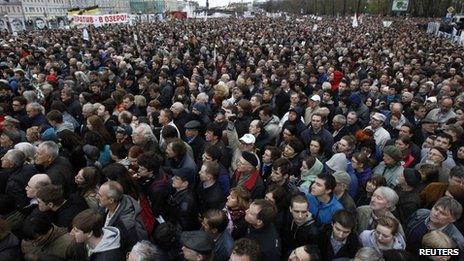Moscow anti-Putin rally draws thousands
- Published

Thousands of people have gathered for a rally in Moscow to mark the anniversary of a confrontation between opposition activists and police.
Opposition leaders put the number of people in Bolotnaya Square at up to 50,000, though police said the figure was about 7,000.
Last year's clashes erupted in the square before President Vladimir Putin's swearing-in.
Of those allegedly involved, 28 have been charged and two convicted so far.
Preparations for the anniversary rally were marred by the death of a man who was crushed by sound equipment.
The man was helping to build a stage when the heavy equipment fell on top of him.
Crackdown
"The whole square is full. There are tens of thousands of us," prominent opposition figure Boris Nemtsov told people crammed into the square.
Anti-corruption blogger and activist Alexei Navalny addressed the crowd, saying a recent series of criminal cases brought against him would not deter him from opposing Mr Putin.
"I do not give a damn. Even if I face 124 cases, I will still say what I want to say," Mr Navalny said.
Some of those at the rally talking about the anti-Putin protest movement
An opposition banner was unfurled at the top of an apartment block in New Arbat street, a major avenue in central Moscow. It read: "Freedom for the 6 May prisoners."
Two activists - Maxim Luzyanin and Konstantin Lebedev - were jailed for deliberately plotting to foment unrest at the Bolotnaya clash a year ago.
Others are still awaiting trial.
Opposition leaders dismiss the notion of a plot, arguing that the authorities provoked the clash.
In many ways, the events of 6 May last year set the tone for Mr Putin's third presidential term, says the BBC's Steve Rosenberg in Moscow.
The Russian authorities used it to crack down on political opponents.
Since returning to the Kremlin, President Putin has signed a string of laws apparently designed to stamp out dissent and weaken civil society, including tougher punishments for unsanctioned protests and legislation which broadens the definition of state treason.
- Published24 April 2013
- Published4 December 2012
- Published26 October 2012